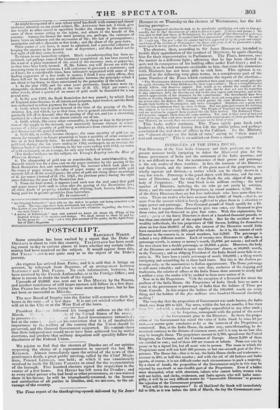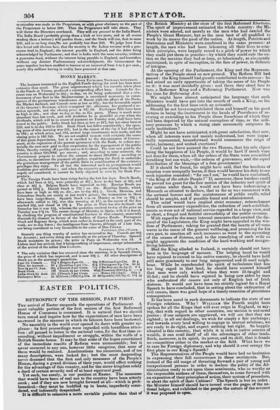INTRIGUES AT TIIE INDIA HOUSE.
TUE Directors of the East India Company and their partisans are at the present moment busily intriguing to defeat the Ministerial plan for the future government of India and the settlement of the India question; and it is not difficult to see that the maintenance of their power and patronage is the sole motive of these worthies. In fact, the interests of the Directors and their friends, and the interests of the great mass of the proprietors, are wholly separate and distinct,—a matter which can he clearly shown in a very few words. Patronage is the grand object with Directors, and the crea- tures of Directors, and the value of the Stock the sole . object-of -the great body of Proprietors... The total Stock is six millions sterling ; the total number of Directors, including the six who go out yearly by rotation, thirty ; and the total number of Proprietors, in round numbers, 2,700. Out of the thirty Directors there are but four individuals who have more than two votes. There are twelve Ivho have no inure than 2,0001. of Stock,—that is, no more than the amount which is barely sufficient to place them iu a situation to enjoy power and patronage. Two thousand pounds of Stock qualify for a Di- rector ; but it requires three thousand to give two votes, -six thousand to give three votes, and ten thousand to give four votes. With this explanation, the
total party of time thirty Directors is short of a hundred thousand pounds, or
less than one-sixtieth part of the capital Stock. But for the accident of two wealthy individuals, the late proprietors of Old Sarum, holding for themselves alone no less than 20,0001. of this, the interest of the Directors would little have exceeded one-seventy-fifth part of the whole. As it is, the interest of each Director in the concern is, in round numbers, but 3,3001. The patronage is indeed a very different matter. Each of twenty-two Directors in office, has a patronage worth, in money or money's worth, 25,0001. per annum ; and each of the two chairs has a double patronage, or 50,0001. a piece. Moreover, the body of the Directors are enabled to spare two Directors' shares, or 50,000/. worth, to the Treasury; and an obliging President of the India Board never fails to re- ceive it. We have here a yearly patronage of nearly 700,000/. ; a thing worth intriguing and scrambling for in these hard times. But this is the Indian pa- tronage only, or the nominations to Indian appointments. The Home patronage is still more valuable; and when we state that, exclusive of the shipping and tradesmen, the salaries of offices at the India House alone amount to nearly half a million a year, the reader will be enabled to form some notion of it.
Now as to the Proprietors. 'Vith the exception of a favoured few about the purlieus of the India House, the Proprietors of India Stock have no more a voice in the government or patronage of India than the holders of Three per Cent. Consols. In this respect the holders of the 100,000/. worth are every thing, and the holders of the jive millions nine hundred thousand absolutely nothing !
The very day that the proposition of Government was made known, the India Stock rose from 208 to 223. Nay more, within the last six months, it has risen from !q q. and with a steadiness and rapidity unparalleled in any other stock ;
! • !_., it not he forgotten, corresponds with the period of the secret . of the Government plan to the Directors. In short, the propo- sition of the Government has raised the value of India Stock by some 18 per cent.,—a matter quite conclusive as far as the interests of the Proprietors is concerned. But, at the India House, the matter may, notwithstanding, be de- termined contrary to the dictates of common sense, and it is easy to see how this may be brought about. The proprietors amount to 2,700, spread over the United Kingdom, the Colonies, and the Continent of Europe. About 2,200 of them are entitled to vote; and of these 400 are women or infants. None can vote by- proxy or by a signed list, but all must vote in person. The room in which the Proprietors meet will not hold 400 persons, or but one-seventh part of the Pro- prietors. The House list—that is to say, the India House clerks and tradesmen— amount to 200, or half this number; and with the aid of old Indians and India agents, of course, it is not difficult under such circumstances to pack a majority. By a show of hands, the proposition of the Government might in this way be rejected by one-tenth or one-twelfth part•of the Proprietors. Even if.a ballot were demanded, what with absentees, infants who cannot ballot, women who will not ballot, and clerks, tradesmen, and India agents, who will ballot intre- pidly, it will be no very difficult matter for "honourable Directors" to procure the rejection of the Government proposal.
What will be the consequence? In all likelihood the Stock will immediately fall to 208, as it was before the 25th of March, the day the Government.com- munication was made to the Proprietors, or with great obstinacy on the part of the Proprietors to below 200. Then the Proprietors will take alarm. They will throw the Directors overboard. They will cry peccavi to the India Board. The India Board (probably giving them a kick or two more, and at all events reading them a lecture) will pardon them ; and the Stock will rise, first to some 230,.and in no long time:Ito not probably less than 250. We judge here from this broad and obvious fact, that the security is the Indian revenue with a gua- rantee fundin_England ; the interest payable in England, and the debts being acknowledged by Parliament; and that in India with the same security, without a guarantee fund, without the interest being payable in England, and heretofore without any distinct Parliamentary acknowledgment, the Government for years together has been enabled to borrow at an interest of from 4 to 5 per cent., nearly fifty millions having in reality been procured at that rate.





















 Previous page
Previous page